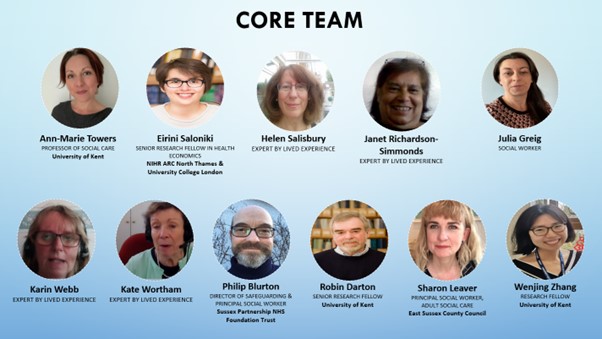)
Supporting older people’s care moves
Transitions into and between social care services (e.g. care homes or extra care housing) can be challenging for older people and their family and friends. The co-produced Better Care Moves for Older People project seeks to provide practitioners and stakeholders with evidence-based resources to guide and support these transitions. Here, Dr Wenjing Zhang, Research Fellow, Centre for Health Services Studies, University of Kent, describes the project’s findings.
How can we improve move-related practice?
Care moves can be proactive, timely and supportive – we can learn from good move examples that fit people’s needs better. However, challenges arise when practical and decision-making support is lacking for older people and their carers. Older people may develop a fear of making a move, for example, loss of individuality, loneliness, being moved without own consent. Equally, family and friend carers might feel stressed, exhausted, and guilty for facilitating the moves.
Practitioners also face challenges when supporting moves, for example, in building trust and effective communication, particularly when there are differences between different stakeholders and services. They also face barriers in sourcing funding and communicating about financial arrangements between different services. Moreover, all stakeholders face system level challenges, including divisions between health and social care as well as between different services within the social care sector, limited workforce capacity, staff shortages, excessive paperwork, limited public budget, and service gaps.
To improve move-related practice, our research suggests a need for a person-centred and more flexible approach for practitioners. They need to have a better understanding of diverse care settings, voluntary organisations and alternative options beyond care homes. More effort is required to improve effective communication between stakeholders and services to ensure consistent support. Care is relational by nature, so it is vital to recognise the importance of actively listening to older people and their carers whilst building trust.
Ensuring organisational and sector-level support for social care practitioners is vital. This includes allowing more time to support each person, providing supervision and peer support, mapping and sharing information about the system, organisations, and processes. It additionally involves facilitating networking opportunities so they can reach other services professionals, learn from others and promote their own services.
We have summarised these findings as follows:
Key principles of good move-related practice
- Good practice should always be person-centred, identifying what this individual wants. Remember, it’s not just about the individual, it’s also about their carers, both family and friends.
- Transitions are periods of change and uncertainty. Make time to keep the older person and their family informed and updated, as this helps people feel in control of the process and offers opportunities to discuss concerns and provide reassurance.
- There are diverse care settings and multiple ways of moves. Older people and their families may not be familiar with the care sector and the options available. Practitioners need to understand the different types of care provision that are available, including the purpose and eligibility criteria of those provisions to ensure appropriate placements are made.
- Moves can be more challenging for people with protected characteristics, such as people with dementia, Black, Asian and other Ethnic Minority (BAME) groups, and Lesbian Gay Bisexual and Transgender (LGBT) groups. Each person’s move should be handled with sensitivity.
- Essentially, communication is key. Practitioners should provide timely information and advice on when and what the options are, and discuss the potential consequences of each option with a clear timeline. Knowing and understanding the options can empower older people and their carers to make proactive decisions, leading to a smoother move.
Co-produced resources for practitioners and stakeholders
The ‘Better Care Moves for Older People’ project was led by a co-production group, including older people and family carers, social care practitioners and managers, and researchers. Our goal was to identify the experiences and expectations of older people and their carers during moves and to understand how social care practitioners currently support, or could better support, these transitions. Alongside our co-production work, we conducted a comprehensive literature review and interviews with eleven family carers, six older people and ten social care practitioners.
The project led to the development of free co-produced video-based materials, available here: http://socialcaretalk.org/older-people-care-moves. These resources include an overview of why and how we need to improve move-related practices – hearing from practitioners and people with lived experience. There is also an animated video illustrating the journey of care moves and messages derived from our interviews, literature review and co-production workshops on how to improve practice and better support staff. We hope that practitioners and stakeholders will use these resources so that ultimately, many more people can benefit from better care moves.
If you’d like to know more about the project, please contact the project lead: Dr Wenjing Zhang w.j.zhang@kent.ac.uk

Read NIHR Social Care Speciality posts here →




